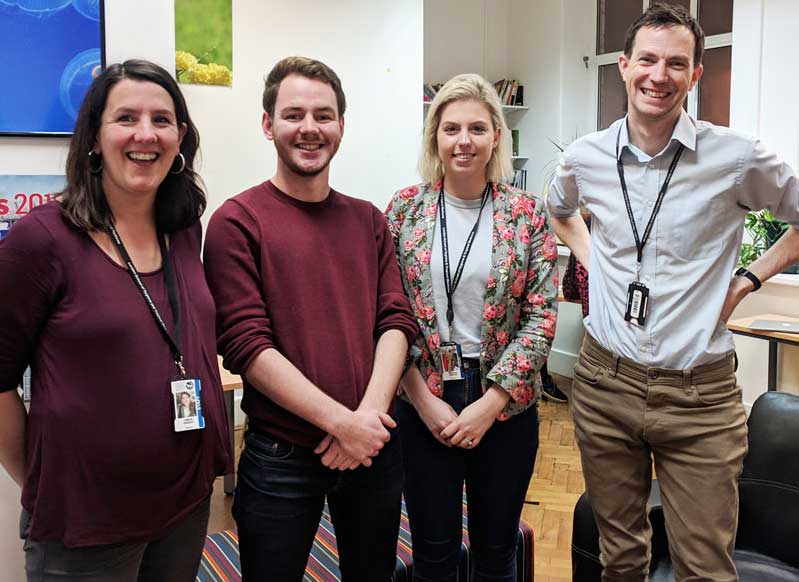Student wins Wellcome Trust data prize for antimicrobial resistance program
Published: 02 May 2019
A first-year PhD student at St George's is part of a team that has won a Wellcome Trust prize for data reuse.
 Dr Gwen Knight, Quentin Leclerc, Nichola Naylor and Dr Alex Aitken.
Dr Gwen Knight, Quentin Leclerc, Nichola Naylor and Dr Alex Aitken.
Quentin Leclerc is a first year MRC-LID PhD student, studying both here and at the London School of Hygiene and Tropical Medicine in the MRC-LID programme funded by the Medical Research Council.
The Wellcome Trust offered a £15,000 prize for novel insights into the spread of antimicrobial resistance (AMR) by using Pfizer's ATLAS dataset, which has been just been made open access. The dataset comprises over a million data points from over 73 countries collected over the past 15 years.
Quentin said: “We decided to focus on empirical therapies – treating conditions that are presented initially before the exact bacteria and precise resistance is confirmed. We wanted to produce a ‘best guess' tool for clinicians; we realised that if we could make their best guess ‘better' then we could improve the chances of successful treatment, and minimize the risk of AMR by holding back any treatments that were unlikely to be successful.”
The Pfizer data created an exceptional opportunity because of its specificity, with each row showing one bacterial isolate taken from a person by age, source of isolate, country, type of bacteria, species, and the resistance profile. Quentin added: “It's rare to get data with such precise detail and it was so much more specific than we were used to.”
The team decided to combine it with other sources, including data about how likely a particular condition was to be caused by a bacterial group, and how resistant that group might be to the first line antibiotic treatment and second line antibiotic treatment in the region.
They encountered some difficulties though; while the ATLAS data was detailed the subsequent breakdowns meant the sample size dropped considerably leading to questions of reliability; and when the team compared it to other datasets, the ATLAS data showed different information. While there were legitimate reasons for that, sampling bias of the different sets was a factor. In addition, solid sources of information about the principal causes of conditions such as sepsis and UTIS was harder to come by than the group expected. One of the team, Consultant Clinician Alexander Aiken, came to the rescue with this, providing feedback and advice from his long experience of treating these conditions.
As a result the eventual tool is, says Quentin, ‘not perfect' but represents huge potential for the treatment of AMR. He sees particular potential for development for low and middle income countries, but for that a bigger player in AMR would need to become involved. For now though he's returning to concentrate on his PhD, which is on the horizontal transfer of AMR genes between different strains of Staphylococcus Aureus.
He added: “It's been a great experience though, and an insight into how much collaboration is needed if the problem of AMR is to be solved. It became clear that there is so much variation between datasets and different countries. A lot of work should be done on harmonizing standards across the world in order to tackle the bigger issues.”
The full team comprised Quentin's supervisor at LSHTM Dr Gwen Knight; Nichola Naylor, Francesc Coll and Dr Alexander Aiken.
Quentin's SGUL PhD supervisor Prof Jodi Lindsay said: “Quentin had a key role in this project, and winning is quite an achievement. The AMR problem will only be solved when multidisciplinary groups work together, and Quentin is developing an amazing networking and skill set to make a valuable contribution”.
Read the team's submission here
Read a Q&A with Quentin here on our Library Blog